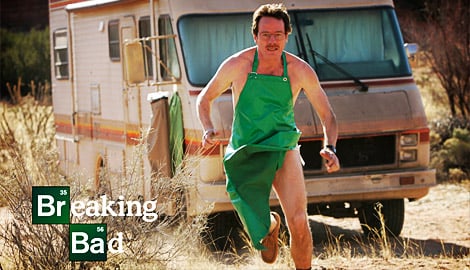AMC: Censorship Doesn’t Matter (Much)
As Breaking Bad barrels toward the end of an excellent season — my fear during the season premiere, that they were going overboard on pretentious symbolism, turned out to be largely unfounded — the show has helped explode a self-serving myth that the broadcast networks used to push in the ’00s: that “adult” shows can’t be done under censorship restrictions.
Share
 As Breaking Bad barrels toward the end of an excellent season — my fear during the season premiere, that they were going overboard on pretentious symbolism, turned out to be largely unfounded — the show has helped explode a self-serving myth that the broadcast networks used to push in the ’00s: that “adult” shows can’t be done under censorship restrictions.
As Breaking Bad barrels toward the end of an excellent season — my fear during the season premiere, that they were going overboard on pretentious symbolism, turned out to be largely unfounded — the show has helped explode a self-serving myth that the broadcast networks used to push in the ’00s: that “adult” shows can’t be done under censorship restrictions.
Not that Mad Men or Breaking Bad operate under as many restrictions as a broadcast show; there’s still a difference between basic cable, where network censorship is based on what the advertisers will accept, and broadcast, which is subject to government restrictions. Still, there are a number of things these shows cannot do or say that would be permitted on pay TV (not to mention the fact that they have commercial breaks, though again, not as many as broadcast). Give or take a few bleeped words and maybe a little blood, there’s not much these shows do that would not be acceptable on broadcast. (Actually, given how much blood there is on broadcast now, there may not be that much daylight between broadcast and cable.)
This may seem obvious, and it is, but the reason I bring it up is that when the modern HBO era began with The Sopranos, the response of many broadcast executives was to claim that HBO had some kind of unfair advantage because they didn’t operate under any limits. The most famous example was NBC executive Robert Wright’s 2001 letter, where he called Sopranos ”a show we could not and would not air on NBC because of the violence, language and nudity,” but (in the same letter) asked his fellow NBC people for ideas on how they could push the envelope on content, within the limits they had. The increased bloodiness of broadcast TV in the last decade probably has something to do with that; networks know that in the U.S., violence has always been subject to less censorship than sex, and the Janet Jackson fiasco just made it easier to emphasize violence over the things that were now taboo, like naughty words and nipples.
What AMC has proven, by doing HBO-style shows (and beating that network at its own game) on basic cable, is that it was more about storytelling than censorship. You don’t have to go as far as Neal Gabler does in that article I linked — where he argues that cable is a fundamentally different and more realistic world than broadcast (Breaking Bad is pretty surreal and very melodramatic, after all) — to agree that there is a cable aesthetic. There’s even a cable theory of how shows should be cut (less flashy) and scored (less music). And if the aesthetic is followed, and the network has good judgment about which shows to pick up and which creators to trust with this kind of freedom, the inability to say certain words or show certain things doesn’t matter all that much. I doubt Mad Men would be any worse if it were allowed to be more explicit, but the creator has made it pretty clear that it’s not a big deal, and the freedom to make the show the way he wants counts for more than anything else.
Which is another way of stating the obvious: the broadcast networks spent the last ten years trying to figure out how to compete with HBO in terms of shocking content, while allowing the giving-notes-on-everything culture and certain outgrowths of that culture (like the tendency to insist that every moment should be given musical scoring) to get out of hand. So that when HBO wasn’t developing a lot of first-rate shows, and there was a chance to jump in and steal its thunder, it was basic cable that jumped in instead.
Well, broadcast networks couldn’t have made shows exactly like Mad Men or Breaking Bad, because those shows aren’t popular enough to get a broadcast-level audience. (Which may be one of the downsides of doing HBO-style shows without HBO’s enticements of explicit content.) But what I find funny is that network executives really did seem to be under the impression that all they needed to learn from HBO was the content and, to a lesser extent, the unsympathetic protagonists. The lessons about production process, editing, scoring and all the other things — things that could be applied to the broadcast model — were mostly ignored, with a few exceptions. (The Office, although it takes its format from a British series, also has some things in common with the HBO model in the way it’s paced, shot and produced.) But the lessons were easy enough to imitate that a struggling basic-cable network could do it.